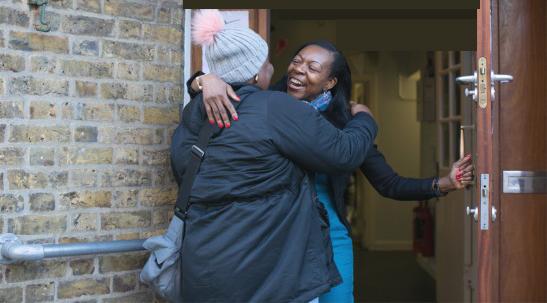The JRS UK hosting scheme offering destitute refugees respite accommodation
As a member of one of the hosting communities, Sr. Margaret Muldoon HFB offered this reflection.
 As members of an international congregation of women Religious, we have committed ourselves to “be with” people who are on the margins; migrants, refugees, those who are marginalized, trafficked, ignored and deprived of their dignity. We do this according to the diversity of our situations and the opportunities available to us.
As members of an international congregation of women Religious, we have committed ourselves to “be with” people who are on the margins; migrants, refugees, those who are marginalized, trafficked, ignored and deprived of their dignity. We do this according to the diversity of our situations and the opportunities available to us.
When our community in London came across the At Home hosting programme organised by the Jesuit Refugee Service (JRS) we welcomed the opportunity to open our hearts and our homes to women refugees accompanied by JRS.
“Every stranger who knocks at our door is an opportunity for an encounter with Jesus Christ, who identifies with the welcomed and rejected strangers of every age.” (Pope Francis, Message for the World Day for Migrants and Refugees 2018)
Beginning something new can be a challenge. Questions, insecurities, fears may arise. Becoming involved through the At Home programme made taking that first, and subsequent, step very easy. We are grateful for the fact that there is a clear agreement between us, as a host community, and JRS, especially the friendly support and accompaniment from the At Home Coordinator who is always available, if and when needed. So far, we have hosted 5 guests, each for a period of 3-4 months and will soon open our home to our next guest.
Each time we welcome a new guest into our home, they each bring something different and make their own unique contribution to our lives. Through each of their placements, there are many common, life-giving aspects that have had an impact on us – a community of four sisters.
“I encourage you to welcome refugees into your homes and communities, so that their first experience of Europe is not the traumatic experience of sleeping cold on the streets, but one of warm human welcome. Remember that authentic hospitality is a profound gospel value that nurtures love…” (Pope Francis speaking to Jesuit students in Rome, 2016)
Firstly, we would like to say that we consider it a privilege to have this opportunity of sharing our home with women, who are living in destitution, often alone and uncared for, longing for that “warm human welcome” that Pope Francis speaks of. Our current guest, Helen, very quickly made herself at home. She is a gentle presence in the community and is free to come and go as she pleases. She is totally trustworthy and accountable. Our only request is that she informs us if she is going to be late coming in to ensure that the door is left unlocked for her.
Sometimes she shares meals with us; at other times, she cooks for herself according to her own preferences. She engages in conversation and shows interest in each one. We listen with respect to whatever she chooses to share with us while ensuring that we do not intrude into her life and that she has her own space and privacy.
Through our interaction with her, we come in touch with destitution, with someone who has nothing and no rights, who is totally dependent on charity. In this way, we are brought close and remain open to, aware of, moved and challenged by a reality that is a lot of millions of people in our world today.
“To the maternal intercession (of Mary) we entrust the hopes of all the world’s migrants and refugees and the aspirations of the communities which welcome them, so that, responding to the Lord’s supreme commandment, we may all learn to love the other, the stranger, as ourselves.” (Pope Francis, Message for the World Day of Migrants and Refugees 2018)
Helen has suffered much in her life, gone through experiences we can’t even imagine and has already spent over 12 years in the country without any support from the government. Despite all that, she shows remarkable strength, courage, and compassion. Her way of living this very challenging situation is an inspiration to us. It helps us to relativize our own difficulties and invites us to grow in openness, compassion, and hospitality. Opening our home has given us the opportunity to make a difference and, in a small way, be a counter-culture to the separation, discrimination, inequality, and injustice that is prevalent in society today.
